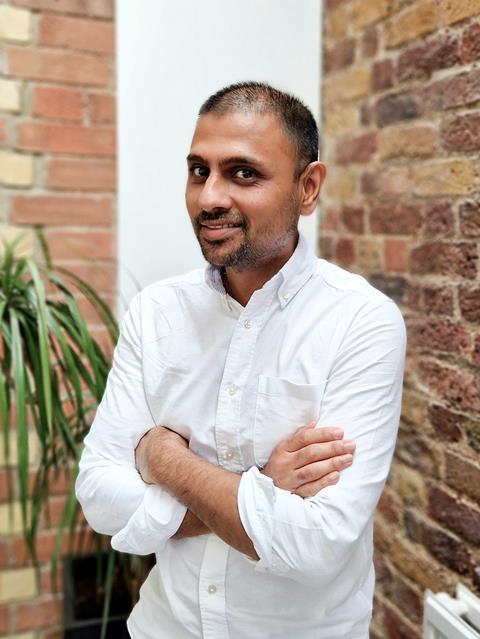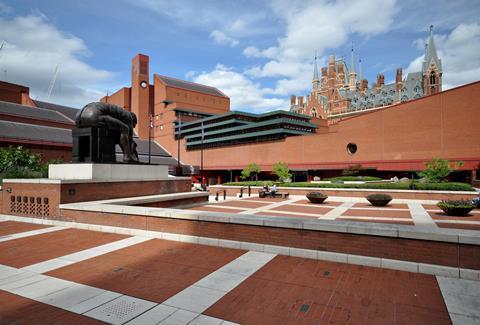The firm’s associate director on the incident that made him want to be an engineer, the vital importance of material reuse and why his mother will always be his role model

Why did you choose construction as a career?
My parents ran a small hardware store and they renovated properties in the evenings and at weekends, so I have always been exposed to the built environment. There was, however, one defining moment:
One day a fire broke out at the shop roof, three storeys up. As the fire brigade were putting the fire out, the water poured inside, destroying the stock. We had buckets to catch it but it was coming through fast, and we kept being asked to get out of the shop.
I quickly put some drainage pipes together with some connectors and a large cowl – all the stuff my parents regularly sold. We managed to divert the water outside and were then able to get out of the shop safely.
It felt good to produce something that worked and helped my parents to save some of the stock. Engineering then felt like a natural fit.
What are you most proud of in your career to date?
Our research on steel reuse at Symmetrys. We are a medium-sized firm with around 35 engineers and we were asked to undertake research and advice in relation to Roots in the Sky, a project by developer Fabrix. We discussed the potential of harvesting steel from a building that was being demolished in Bishopsgate.
Demolition of the building had already commenced and so we only had two weeks to advise Fabrix if they could buy this steel to reuse it in their Roots in the Sky scheme. We pulled together the office to brainstorm all the possible issues: how could we ensure the steel was not damaged or deformed? How could we transport it safely and efficiently? How can we find a fabricator who would be willing to work with imperfect steel?
It epitomised teamwork – everyone in the company rolled up their sleeves and contributed, from dealing with key issues like plastic deformation to picking up the phone to fabricators. We must have called 20 to 30 suppliers before Cleveland Steel called back with some very proactive assistance. We concluded that it was indeed possible.
We have continued our research into this construction technique and, with London South Bank University, we have developed FerrousWheel, a digital tool to accelerate the process of designing with reclaimed steel.
What has been the biggest challenge of your career to date?
Again, our initial research on steel reuse – we had such a short time to do our research and advise the client.
If you could change one thing about the industry, what would it be?
Be quicker to adopt innovation. For example, I have often been frustrated with the slow adoption of modular construction. Our current method of building is very inefficient and wasteful, and we don’t have sufficient labour to build like we used to. We really need to start thinking more like the automobile industry.
Having said that, the concept of steel reuse has taken off more quickly than our wildest expectations. Now, we just need demolition contractors to realise that it is a win-win. They can get higher rates for harvesting steel than cutting steel into small chunks for scrap.
What is the most helpful advice that you have been given?
At school, I had always struggled to concentrate and study. My brother gave me some great advice just before I was about to start revising for my GCSE’s.
He simply outlined the choices that I had: either I continued to get distracted, or I focused and studied, got good grades and was able to make something of my life.
Name your favourite building in the world?
King’s Cross and St Pancras Station. I have been there many times and I am just amazed by it.
Which famous building do you most dislike?
The British Library… I just don’t like it. Does anyone agree?

Which famous building do you wish you had worked on?
The Taj Mahal. It has everything: a great story, determination, it is stunning, built without heavy machinery and has stood the test of time.
What single piece of advice would you give to someone starting out in your profession?
Get some construction experience. It is extremely underrated but essential to be a good engineer.
Who do you most admire in the construction industry?
My mother. She is a competent plumber, decorator, fixer and the most widely skilled human I know. She took down my chimney at home much quicker than anyone else could! On top of that, she is a fantastic mother.
However, I grew up watching her having to face so much sexism. Everyone always assumed she was there to make the tea. I hate what she had to put up with, but it did make her the strong person she is today.
The industry has come a long way but admittedly it still has some way to go. We need to keep pushing for diversity.

What is it like being you (and doing your job)?
It is a bit like having ants in your pants all the time. It is an incredible challenge but highly rewarding, and it wouldn’t be possible without my fantastic colleagues who are always there to provide support.
Do you have a life philosophy?
Just keep going, no matter how hard it gets.
What do you think your best quality is?
To keep things simple.
Name three things that you like
Bhajia, which is deep-fried potato slices in a batter, from Maru Bhajia in Wembley.
Long Summer days. It just does make life that bit better, and it’s great to be able to come home from work and play with my boy in the garden.
Barbecues with all my family. There’s nothing quite like it!
Tell us about a secret skill that we don’t know you have
I have some dance moves!
Early bird or night owl?
Early bird. I’m up at 6am no matter what day of the week it is or what time I went to bed.
What is your favourite food?
Indian, I love cooking it and eating it!
What would your superpower be?
To be able to see into the future. It feels like I try to do that everyday!



























No comments yet